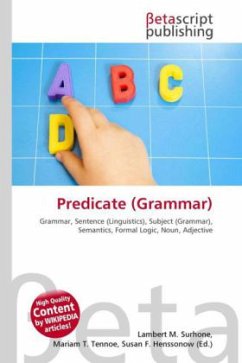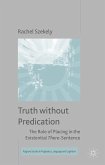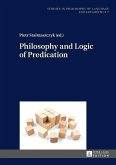High Quality Content by WIKIPEDIA articles! In traditional grammar, a predicate is one of the two main parts of a sentence (the other being the subject, which the predicate modifies). For the simple sentence "John [is yellow]," John acts as the subject, and is yellow acts as the predicate, a subsequent description of the subject headed with a verb. In current linguistic semantics, a predicate is an expression that can be true of something. Thus, the expressions "is yellow" or "is like broccoli" are true of those things that are yellow or like broccoli, respectively. This notion is closely related to the notion of a predicate in formal logic, which includes more expressions than the former one, like, for example, nouns and some kinds of adjectives.
Bitte wählen Sie Ihr Anliegen aus.
Rechnungen
Retourenschein anfordern
Bestellstatus
Storno








